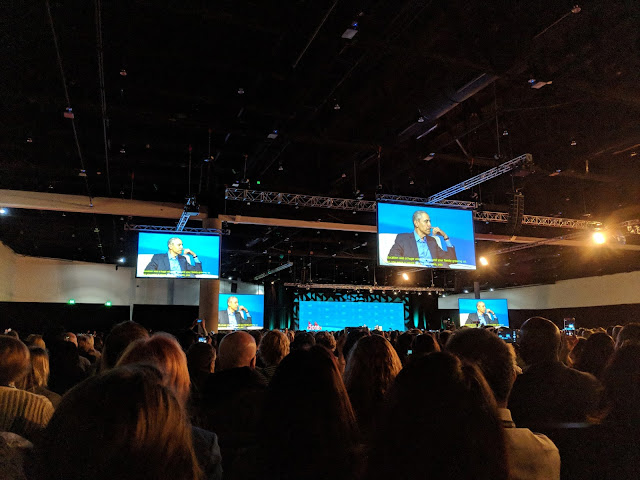Office Politics: A Theological Look at The Problems of Monoculture
With the midterm elections just two weeks away, pundits are anxiously anticipating how America's balance of power may shift. Yet no matter which party gains control of the House and Senate, this country will remain entrenched in hyper-partisan conflict. Our political divisions will only continue after November 6th - and may well be exacerbated in the likely event that Democrats gain the House while Republicans keep the Senate.
Our divisions are not limited to the realm of ideology. According to a recent study by Pew Research, 67% of Democratic voters mostly associate only with other Democratic voters. The trends are similar on the right. And as political liberals continue to migrate towards American cities, this social gulf will only expand. As a resident of hyper-leftist Madison, I had to scratch my head to try to count the number of conservative voters with whom I have had lunch since the 2016 Presidential election. I think I can count that number on one hand, maybe two if you count Dane County Libertarians.
Predictably, our pervasive and all-encompassing political divisions have steadily entrenched themselves in the workplace.
The office may once have been the last fortress of ideological diversity. Intuitively, it makes sense that most workplaces would reflect the political landscape of the country. I can choose not to drink Budweisers with the deplorables Trump voters at the local blue collar watering hole. But I am not going to avoid a Trump voter if they are my co-worker. I'm being paid to work alongside them - even if their views on everything from climate science to Saudi Arabian assassinations openly flaunt the objective facts. I will keep working with the hypothetical Trumpistas at my hypothetical place of work because, well, money talks - even louder than Twitter feeds and Facebook posts.
 |
| Barack Obama addresses the 2018 ATD International Conference, a keynote that sparked no shortage of controversy on the conference's Facebook page. |
The only problem with this scenario is that it is completely imaginary. Our workplaces have become just as politically divided as the rest of society, especially in the technology sector. The tech industry, after all, donates large sums to Democratic candidates, and often welcomes liberal stump speeches at company all-hands meetings. At my previous employer, candidate Hillary Clinton was greeted at company headquarters with a standing ovation. To my recollection, our most war criminal "conservative" speaker, Henry Kissinger, was greeted with employee protests and boycotts.
Political monoculture equally affects industry on the left (technology, education) and the right (manufacturing, agriculture). And it is bad for business. Not only does monoculture prompt political backlash when the opposition party gains power, but a lack of ideological diversity hurts the bottom line. How effectively can a liberal Mountain View, CA firm sell to a conservative manufacturing group in North Dakota? How effectively can a right-wing metals trader deal with a liberal phone manufacturer in Cupertino? Political values will inevitably yet stealthily bias our business transactions as we continue our partisan entrenchment, gradually filtering potential business partners on the basis of their partisan affiliations and campaign contributions.
Monoculture is also an impedance to the most well-intentioned corporate inclusivity initiatives. We can preach inclusivity and tolerance from the office all we want - but if our companies lack political diversity, are we actually catalyzing constructive change in the areas our nation most needs it? Many firms have begun to promote their approaches to diversity and inclusion as foundational to their culture and business strategy. These initiatives will succeed to the extent that they can promote tolerance of political disagreement and civility. If political inclusivity cannot be achieved in the workplace, where can it be?
The early Jesus movement was built on radical inclusivity, most notably, of the political variety. The Biblical accounts of Jesus' life are short on the biographical specifics of his earliest followers, but are keen on noting that his disciples included tax collectors like Matthew and political zealots like Simon - a veritable cohort of Bannons and Bernies. The movement had remarkable success in achieving its mission to spread the Jesus story to the ends of the Earth, and this is no coincidence. The political diversity of Jesus' earliest followers, which continued throughout the first centuries of the Christian faith, was perhaps the movement's greatest tactical asset. The Jesus movement was capable of changing the lives of imperial powers (alt-right?) and rabble rousers (Antifa?) alike because it was led by imperial powers and rabble rousers who gathered in the same ancient conference rooms. With some 2.2 billion Christians alive today, it is not unreasonable to suggest that the 2,000 years of sustained growth of the Christian faith represents the greatest organizational success in human history, a success that materialized in part due to its ability to constructively engage political dissonance.
If America is to escape from its current malaise, the workplace might just lead the way. For the sake of an organization's bottom line, it might have to be. The office may just be the one place left that can produce meaningful encounters between left and right - provided we are willing to let the other side through the front door.
@ryanpanzer is a Lutheran blogger who regrets most of the things he tweeted in November of 2016. He endorses Tony Evers for governor.


After Reading All your posts i got an cool New Ideas and It's solve all My queries...Here Some Different kind of Information's for you...
ReplyDeleteJava training in chennai | Java training in annanagar | Java training in omr | Java training in porur | Java training in tambaram | Java training in velachery